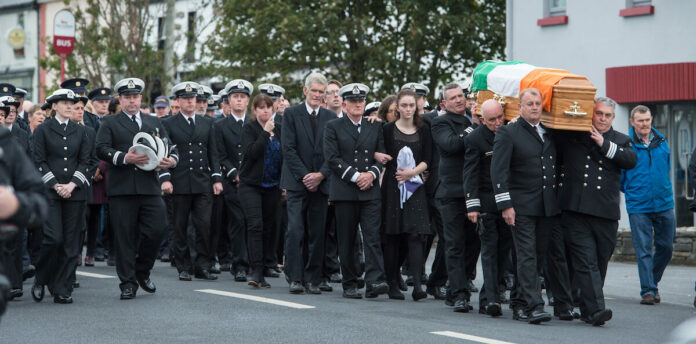THE failure to conduct an inquest into the tragic death of a Doolin volunteer at sea is a breach of her constitutional rights, an international maritime lawyer has claimed.
Mother-of-two Caitriona Lucas (41), an advanced coxswain with Doolin Coast Guard died off Kilkee on September 12, 2016.
Ms Lucas was helping the neighbouring Coast Guard unit from Kilkee in the search for a missing man, but she died after its rigid inflatable boat (RIB) capsized in a shallow surf zone. Two other crew members on board the RIB, who were also thrown into the sea, survived.
Michael Kingston has questioned why an inquest has yet to be held into the death of Caitriona Lucas, the first Irish Coast Guard volunteer to lose their life during active service.
“It is shocking and totally unacceptable that almost six years after Ms Lucas’s death, no inquest has as yet been heard.
“This is a breach of Caitriona Lucas’ human rights and the rights of her family under the European Convention of Human Rights.
“The state has failed Caitriona Lucas and her family by not holding the inquest.
“Why has this inquest not happened. What is being hidden? The state has an obligation to carry out an inquest, what are they afraid of? asked Mr Kingston.
“A properly conducted coroner’s inquest must get to the bottom of what happened to uphold the human rights of Caitriona and her family and to protect other Irish citizens with recommendations to ensure this never happens again.”
Speaking from a United Nations International Maritime Organisation event in London where he is attending meetings on maritime safety as a consultant, he said this inquest needs to be carried out “as a matter of urgency”.
Two separate investigations were completed into the circumstances surrounding her death. The first, the Marine Casualty Investigation Board (MCIB) report, was published in two parts in December 2018.
Approximately 18 months ago, Ms Lucas’ husband, Bernard Lucas, was informed by the Director of Public Prosecutions that no criminal charges would be brought after a separate investigation by the Health and Safety Authority.
The MCIB report was critical of the Irish Coast Guard’s safety management system, and catalogued a number of systems and equipment failures in relation to the Kilkee Coast Guard unit.
Describing the Marine Casualty Investigation Board report as “flawed,” Mr Kingston said it is imperative that an inquest is held as quickly as possible to establish the cause of her death and to fully understand what happened in an effort to prevent the possible further death of volunteers at sea.
He said inquests like this are supposed to be held in a timely fashion to reduce the risk of further loss of life.
He pointed out the MCIB report into the Kilkee accident didn’t properly take into account key witness statements, the location of the accident wasn’t correct, while the equipment that
Caitriona Lucas was wearing wasn’t investigated properly.
He said the Kilkee accident needs to be investigated again.
He pointed to an inquest in Donegal in May of this year into the deaths of Thomas Weir and Gerry Doherty off Malin Head in 2018 that identified serious failings, which were not identified in the MCIB report into that incident.
Consequently, the jury made critically important recommendations to the Department of Transport.
It is understood because Ms Lucas was pronounced dead in hospital in Limerick the Limerick Coroner’s Office is responsible for her inquest.
Speaking to the Clare Champion, Bernard Lucas confirmed he had had “no contact” from the coroner’s office about the holding of an inquest or even a projected time frame for holding one.
“There has been zero contact. There has been no contact whatsoever. I was told if there was no criminal charges being brought following the Health and Safety Authority investigation, which is the case, then the inquest could go ahead.
“This decision was made about 18 months ago.”
He said it is a “bit scary” the inquest hasn’t even started at this stage in view of the circumstances surrounding his wife’s death.
He claimed the MCIB report was pointless because it contained so many errors and responded “noted” in the official report when interested parties raised concerns and issues in their submissions, which raised the question what does this mean.
“What does ‘noted’ mean? The very basic thing concerning the accident site was incorrectly stated a mile away.
“If you can’t get the fundamental facts right, how can you have any faith in the rest of the report? There was loads of other errors and questions have been raised about the way the report was conducted, which is not very reassuring in terms of the investigation of marine accidents.”
In his submission to an MCIB draft of the final report, he queried why the investigation didn’t address the loss of helmets by the crew and failure of life jackets to inflate, among other issues.
He also questioned why it had not addressed the failure to find personal locator beacons worn by the crew.
Along with members of the Kilkee Coast Guard unit who commented on the MCIB draft report, he also highlighted an incorrect location for the capsize.
The Limerick Coroner’s Office was contacted for a comment but hadn’t responded at the time of going to press.
East Clare correspondent, Dan Danaher is a journalism graduate of Rathmines and UL. He has won numerous awards for special investigations on health, justice, environment, and reports on news, agriculture, disability, mental health and community.


